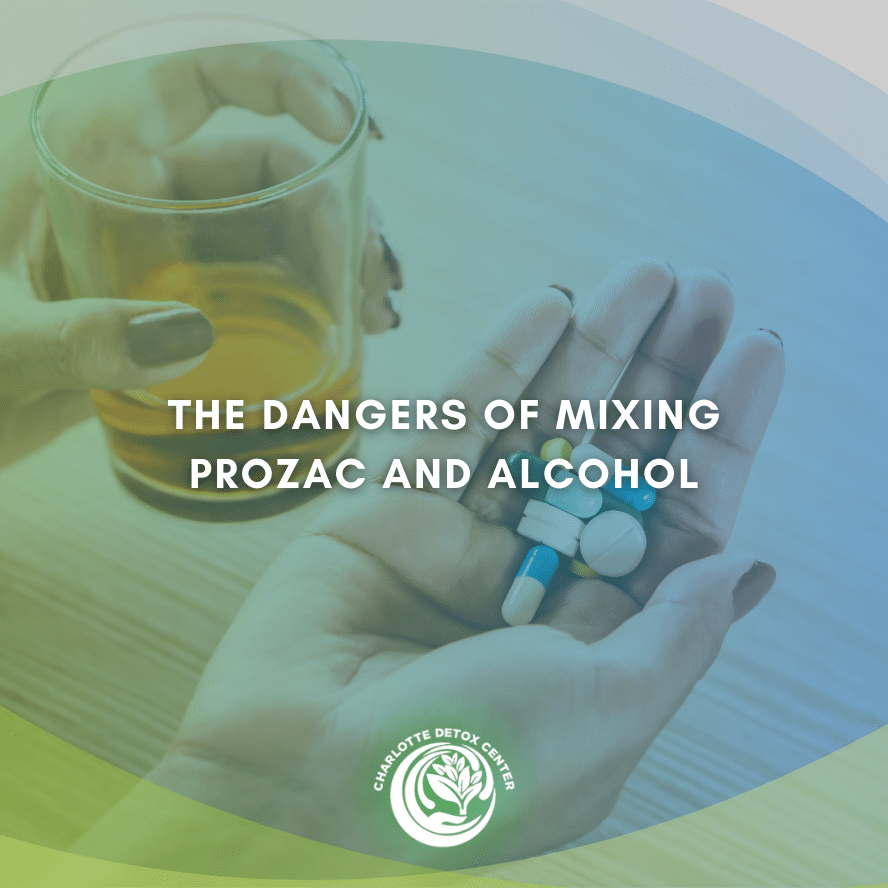The Dangers of Mixing Prozac and Alcohol

Medically Verified: 2/1/24
Medical Reviewer
Chief Editor

All of the information on this page has been reviewed and verified by a certified addiction professional.
Millions of people in the United States experience periods of depression, and many take medications to help them manage their symptoms. While prescription antidepressant drugs are considered safe when used as directed, mixing them with alcohol can have unintended–and sometimes severe–risks and complications.
Prozac is a commonly prescribed antidepressant used during treatment for major depressive disorder (MDD) and other mental health conditions. Drinking alcohol while taking Prozac can cause worsening symptoms of depression and other adverse side effects. It may also lessen the effectiveness of Prozac.
Understanding the risks of mixing Prozac and alcohol is essential so that you can make informed choices about your substance use. If you struggle to stop drinking while taking Prozac, you may benefit from professional substance abuse treatment and ongoing support.
Reach out to the Charlotte North Carolina Detox team now to learn about our effective, supportive detox and treatment programs or schedule an intake assessment.
What is Prozac?
Prozac is the brand name for a generic drug called fluoxetine. It is an FDA-approved prescription medication that can be effective at helping people manage the symptoms of major depression and other conditions, including:
- Obsessive-compulsive disorder (OCD)
- Bulimia nervosa
- Panic disorder
- Depression related to Bipolar I Disorder
- Treatment-resistant depression
The effects of Prozac include:
- Relaxation
- Decreased anxiety
- More energy
- Better focus
- Improved sleep quality
Prozac works by increasing serotonin levels in the brain. Serotonin is a neurotransmitter believed to influence behaviors, sleep, mood, and emotions.
The Side Effects of Prozac and Alcohol
Like all medications, Prozac can cause unwanted, adverse side effects. People may experience side effects that range from mild to severe, depending on their health and other personal factors. Alcohol also has its own side effects
Side effects of Prozac
Prozac’s side effects include:
- Loss of coordination
- Sleep problems
- Drowsiness
- Low blood pressure
- Liver damage
- Headache
- Loss of appetite
- Nausea
- Diarrhea
- Dizziness
- Sweating
- Anxiety
These side effects can vary in intensity and duration depending on a person’s health and other factors.
Side effects of alcohol
Alcohol’s side effects include:
- Mood swings
- Vomiting
- Loss of consciousness
- Blackouts
- Alcohol poisoning
- Seizures
- Coma
- Risk-taking behaviors
- Death
The side effects of alcohol can vary from person to person and typically become more severe the more alcohol a person consumes. However, even small amounts of alcohol can have dangerous or unwanted effects.
Alcohol can worsen the adverse side effects of Prozac. Alcohol works in the body by depressing activity in the central nervous system (CNS), while Prozac is an antidepressant. Mixing these two substances can have dangerous–even life-threatening–complications.
The Dangers of Mixing Prozac and Alcohol
Prozac and alcohol each have side effects, and mixing these substances may result in worsened or additional complications.
Here are some of the most significant risks of mixing Prozac and alcohol.
Impaired judgment
Mixing alcohol and Prozac can have a negative impact on your judgment and memory. Prozac can improve cognition and memory, but alcohol can reduce the drug’s ability to work while also impairing a person’s judgment.
Anxiety
While many people take Prozac to help them manage symptoms of anxiety, mixing Prozac and alcohol can actually worsen anxiety.
Depression
People often take Prozac to help them manage the symptoms of depression. However, alcohol can reduce the amount of serotonin in the brain and depress CNS activity, leading to worsening depression.
Hearing problems
Alcohol affects the hair cells in the inner ear and can cause hearing loss. Prozac can also cause sensorineural hearing loss–meaning hearing loss due to structural damage or change. Mixing Prozac and alcohol can worsen the progression of hearing loss.
Vision problems
Prozac and alcohol both dilate blood vessels in the eyes, which can damage the optic nerve. People who mix Prozac and alcohol may develop vision problems or glaucoma, even if they have no history of vision problems.
The complications of mixing Prozac and alcohol can be severe and require additional treatment. Medical professionals typically advise that people taking Prozac avoid any alcohol consumption.
Can Mixing Prozac and Alcohol Ever Be Safe?
Many people may want to drink from time to time while taking Prozac or other antidepressants. But is it ever safe?
Medical professionals advise people not to mix alcohol and antidepressants because of the risk of adverse side effects. Even in smaller doses, Prozac can still interact negatively with alcohol.
If you take Prozac, it’s important to continue taking it exactly as your doctor prescribes and avoid drinking alcohol. Prozac can remain in your system for days after your last dose, so you may need to avoid drinking alcohol for several days after discontinuing the medication.
You must not discontinue Prozac on your own. Follow your doctor’s advice when quitting Prozac, and do not drink alcohol until your doctor tells you it is safe to do so.
If you find that you are unable to stop drinking while taking Prozac, you may require professional help for alcohol abuse or addiction. Seek treatment to stop drinking and learn how to avoid relapse safely.
Find Help Now
Alcohol abuse and addiction are complex, deeply rooted issues that require compassionate, comprehensive treatment that begins with detox.
If you need professional treatment to safely stop drinking and avoid relapse, you are not alone. Contact the team at Charlotte North Carolina Detox now to learn about our effective detox programs or to schedule an intake assessment.
